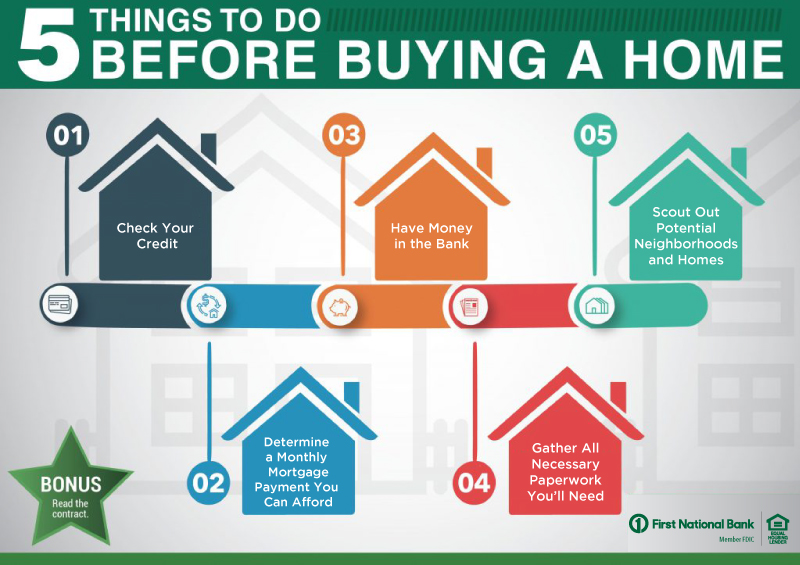-
-
-
FNBO
MortgageOct 01 2018
-
-

5 Things To Do Before Buying A Home
You finally got that promotion you’ve been bucking for – congrats. You and your spouse have saved up some money, too. Suddenly, that one-bedroom apartment seems cramped. So? Are you ready to make the big move? Ready for a mortgage payment every month for the next 30 years? Before you get started, consider these five to-dos:
First things first: Check your credit.
A homebuyer’s credit score is among the most important factors when it comes to qualifying for a mortgage loan. A score above 720 is generally considered good, and 750 to 850 is excellent. The higher your score, the better rate you will get. Pretty obvious. One significant way to raise your credit score is to pay down your debt. If you have credit card debt, pay it down, and pay your bills on time. “If you don’t have a good credit score, you may not get the best [interest] rate. In fact, you may not get a loan, period,” says Michael Eisenberg, a certified public accountant and personal financial planner with Eisenberg Financial Advisors in Los Angeles.1
Determine a monthly mortgage payment you can afford.
Alan LaFollette, Vice President, Home Lending at FNBO, said one of the first things for potential homebuyers to do is sit down and figure out their budget. “Know what you can afford and have a maximum payment in mind that you are comfortable paying before you get pre-approved by a lender,” he said. “Also, you will need to have an idea of how much you have available for a down payment and closing costs.” Once you know your comfort zone for a payment, schedule an appointment to get pre-approved for a mortgage loan.2
Have money in the bank.
Most experts suggest that you have at least 20 percent of the house’s purchase price saved as a down payment. You can still buy a house without putting that much down, but you can avoid such things as paying private mortgage insurance. The Federal Housing Administration has lowered down payment requirements for mortgages it insures to as low as 3.5 percent to make it easier for buyers to get into the market. There are also down payment assistance programs available. “I’ve helped arrange assistance loans for $10,000, which are interest- and payment-free, and forgivable after five years. Although considered a loan, they’re more like grants. Other programs can provide up to $40,000 interest-free,” says Mike Winesburg, formerly a mortgage planner with McKinley Carter Wealth Services in Wheeling, West Virginia.3
Gather all the necessary paperwork you’ll need:
Tax records, paycheck stubs, credit card and student loan information, etc. “You should begin to collect important finance information for the lender,” said Alan LaFollette, Vice President, Home Lending at FNBO. “It is always best to use the ‘rule of two’: two pay stubs, most recent two years of W-2s (may need most recent two years of tax returns – both personal and corporate, if applicable); most recent two months’ bank statements on all asset accounts; and information on any investment or retirement accounts.” Typically, your house payment (with taxes and insurance) and all other monthly obligations should not exceed 41 percent of your gross income.4
Scout out potential neighborhoods and homes.
School districts, property taxes and the amount of rental properties in a neighborhood are factors to consider. Says Fox Business: If you are buying a house in a neighborhood full of renters, it only takes a few bad renters or bad landlords to drive the neighborhood down fast. If the neighborhood is full of single people, will you be happy there if you have young children?5
BONUS: Read the contract.
“Purchasing a home is one of the most important financial decisions in your lifetime, so make sure you understand the terms of your contract,” says Alan LaFollette at FNBO, which was voted “Top Urban Lender for NIFA” for seven years in a row. “Once all the paperwork is gathered and reviewed, and once the real estate purchase contract is drawn up, read it closely. The contract states everything you’re getting and not getting in your new home, so pay attention to the details. Ask for clarification on anything you don’t understand, and only sign the agreement when you agree to all of the details.”
“We like to be with our customers throughout the entire process – we handle all the tedious details so they can focus on bigger things that matter to them most. Ultimately, our customers are able to make a more informed decision.”
Got Questions? Stop by your local FNBO branch today and visit with a mortgage loan expert. Contact one today.
1 U.S. News & World Report - http://money.usnews.com/money/personal-finance/articles/2014/05/23/a-checklist-for-first-time-homebuyers
2 Lincoln Business Journal, Oct. 1, 2016
3 Bankrate.com - http://www.bankrate.com/finance/mortgages/5-tips-for-first-time-home-buyers-1.aspx#ixzz4WExA2aIw
4 Midlands Business Journal, Feb. 12, 2016
5 Fox Business - http://www.foxbusiness.com/features/2014/06/19/10-tips-most-first-time-home-buyers-dont-consider.html
The articles in this blog are for informational purposes only and not intended to provide specific advice or recommendations. When making decisions about your financial situation, consult a financial professional for advice. Articles are not regularly updated, and information may become outdated.